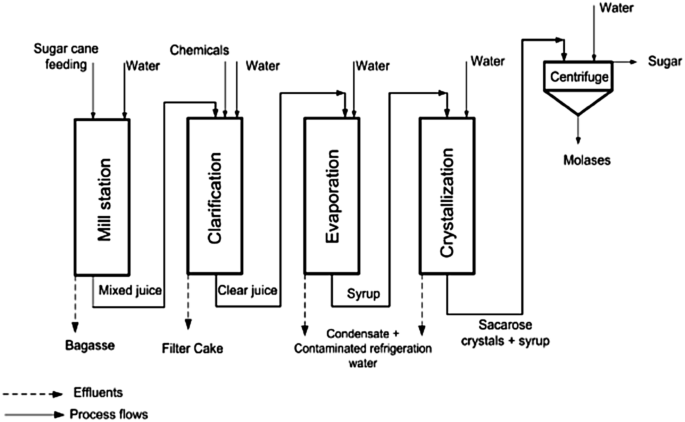Discover the Cutting-edge Benefits of Products From Sugarcane for Lasting Living
Sugarcane has emerged as a critical source in the quest for sustainable living. Its varied applications span biodegradable packaging, renewable resource, and much healthier food options. As sectors seek eco-friendly alternatives, sugarcane's flexibility provides encouraging options. The true potential of sugarcane prolongs beyond its current usages. Exploring its innovative advantages can disclose new pathways towards an extra sustainable future. What other possibilities might this exceptional plant hold?

The Increase of Sugarcane as a Lasting Source
As international understanding of ecological issues expands, sugarcane has arised as a famous lasting source. This versatile plant uses a variety of benefits that add to environment-friendly techniques. Sugarcane is a renewable energy, with the ability of thriving in diverse climates while taking in carbon dioxide, thus mitigating greenhouse gas emissions. Its quick development cycle permits for frequent harvesting, causing a continuous supply of raw material.Additionally, sugarcane growing usually needs much less water compared to various other crops, making it an efficient alternative in water-scarce regions. The by-products of sugarcane, such as bagasse and molasses, can be repurposed for various applications, reducing waste and advertising round economic situation concepts. Innovations in farming techniques have actually led to more sustainable farming approaches, even more improving sugarcane's ecological profile. As consumers increasingly seek lasting options, sugarcane attracts attention as a practical alternative for those devoted to lowering their eco-friendly impact.
Eco-friendly Packaging Solutions
Just how can naturally degradable packaging remedies change the way consumers come close to sustainability? By using sugarcane-based materials, these ingenious services supply an engaging choice to typical plastics. Naturally degradable product packaging made from sugarcane breaks down naturally, markedly lowering garbage dump waste and greenhouse gas discharges. As consumers become progressively mindful of their environmental effect, the demand for lasting packaging remains to rise.These sugarcane-derived products not just serve practical functions however likewise align with eco-conscious customer worths. They offer a tangible means for individuals and organizations to add to a circular economic situation, advertising source effectiveness and lessening ecological impacts. Additionally, as industries adopt naturally degradable choices, they promote a culture of sustainability that reverberates with an expanding market seeking accountable choices.In significance, naturally degradable packaging solutions from sugarcane stand for an important progression in lasting practices, equipping consumers to make ecologically friendly decisions without giving up comfort or quality.
Renewable Energy Generation From Sugarcane
A significant portion of renewable resource generation can be originated from sugarcane, showcasing its convenience beyond standard farming usages. Sugarcane biomass, consisting of bagasse and leaves, is a powerful resource for bioenergy manufacturing. This biomass can be converted right into biofuels such as ethanol, which works as a cleaner option to fossil gas. Furthermore, the combustion of sugarcane results generates vapor and electricity, giving an energy resource for sugar mills and neighboring communities.The farming of sugarcane likewise adds to carbon sequestration, as the plants take in carbon dioxide during their growth cycle. By making use of sugarcane for power, waste is lessened, and sustainable methods are encouraged. This renewable resource method not only supports power needs but also advertises rural growth, producing work in bioenergy industries. On the whole, sugarcane attracts attention as an essential player in the shift to sustainable energy remedies, straightening with international efforts to minimize carbon impacts.

Eco-Friendly Textiles and Fabrics
Eco-friendly textiles and materials originated from sugarcane present an appealing alternative to typical products. These biodegradable options not just reduce environmental influence yet likewise use resilience and efficiency similar to standard textiles. Lasting production procedures further boost their allure, making them an essential part of a lasting way of living.
Eco-friendly Textile Options
Why is the adjustment toward eco-friendly textile choices necessary for sustainable living? The raising awareness of ecological destruction has actually prompted a search for options to conventional textiles, which typically add to air pollution and waste. Naturally degradable fabrics, originated from renewable energies such as sugarcane, offer an encouraging service. These products break down normally, reducing garbage dump accumulation and reducing ecological effect. Furthermore, they can assist reduced carbon footprints and reliance on nonrenewable fuel sources. As consumers come to be more eco-conscious, the demand for lasting textiles grows, encouraging manufacturers to spend and innovate in biodegradable options. This modification not only sustains lasting methods however also fosters a round economic climate, leading the way for a more responsible technique to style and fabric manufacturing.
Longevity and Performance
When examining environmentally friendly textiles and textiles, longevity and performance are crucial aspects. Sugarcane-derived products demonstrate outstanding toughness and resilience, making them suitable for various applications. These fabrics frequently exhibit exceptional moisture-wicking residential properties, which boost convenience in everyday wear. In addition, their natural fibers contribute to breathability, guaranteeing that garments stay wearable and fresh also popular conditions. The efficiency of sugarcane-based materials expands to their resistance to tear and put on, allowing items to maintain their integrity over time. These environmentally friendly textiles can be dealt with to boost UV defense and stain resistance, satisfying the sensible demands of customers without endangering sustainability. Inevitably, sugarcane textiles provide an unified balance of longevity and performance, attracting eco mindful people.
Sustainable Manufacturing Processes
The excellent longevity and efficiency of sugarcane-derived fabrics are enhanced by lasting manufacturing processes that focus on ecological duty. These procedures use renewable resources, decreasing dependence on nonrenewable fuel sources and minimizing carbon impacts. By utilizing the spin-offs of sugarcane cultivation, manufacturers can create environmentally friendly fabrics while advertising waste reduction. Advanced strategies, such as water-efficient dyeing and naturally degradable therapies, additionally enhance the sustainability of these textiles. Furthermore, using non-toxic chemicals guarantees that the manufacturing process does not hurt ecological communities or human wellness. This commitment to sustainability not just attract eco conscious consumers but additionally sustains neighborhood economic climates by advertising lasting agricultural techniques. Overall, sugarcane-derived fabrics stand for a considerable step towards a greener future in the fashion market.
Sugarcane-Based Biofuels and Their Influence

Sugarcane-based biofuels have actually emerged as a significant alternative energy source, offering an eco-friendly remedy to the world's growing energy needs. These biofuels, acquired from the fermentation of sugarcane juice or molasses, offer an even more lasting option compared to nonrenewable fuel sources. Their production process produces reduced greenhouse gas discharges, contributing to environment change mitigation efforts.Additionally, sugarcane biofuels can enhance power security by expanding energy sources and decreasing dependancy on imported oil. The farming of sugarcane additionally advertises rural advancement, creating work and boosting local economies.However, issues pertaining to land usage and food competition linger, as raised biofuel production might impact food supply chains. Sustainable agricultural practices are necessary to balancing these completing passions and ensuring that biofuel production does not weaken food protection. On the whole, sugarcane-based biofuels represent an appealing avenue for a greener power future, provided that their environmental and social effects are carefully managed.
Much Healthier Alternatives: Sugarcane in Food Products
While lots of customers seek much healthier options in their diet regimens, sugarcane items use a healthy alternative to refined sugars and man-made sugar. Stemmed from the all-natural extraction of sugarcane juice, these products retain important nutrients, consisting of vitamins and minerals, that are usually shed in processed sugars. Sugarcane has antioxidants and dietary fiber, adding to general health and wellness and wellness.Many health-conscious people are turning to sugarcane syrup and jaggery, which supply a reduced glycemic index contrasted to traditional sugars, making them ideal for those managing blood glucose degrees. Additionally, sugarcane-derived sweeteners can improve the taste of numerous meals without the unfavorable effects connected with man-made additives.This change towards all-natural sweetening representatives not just advertises better dietary selections yet additionally lines up with sustainable living techniques, as sugarcane is a renewable energy. Sugarcane products are emerging as beneficial choices in the domain name of food items.
The Future of Sugarcane in Lasting Technologies
The future of sugarcane is poised to incorporate ingenious applications that extend beyond typical uses. Its possible as a source for eco-friendly product packaging solutions and renewable energy resources highlights its role in sustainable techniques. Exploring these innovations could substantially impact environmental conservation and source management.
Naturally Degradable Product Packaging Solutions
An increasing variety of firms are turning to eco-friendly product packaging options stemmed from sugarcane as an encouraging option to traditional plastics. These innovative products, typically made from sugarcane fibers and bioplastics, decay naturally, minimizing the durable environmental effect associated with conventional plastic waste. By using sustainable resources, sugarcane-based packaging adds to an extra lasting production cycle, straightening with worldwide initiatives to deal with air pollution have a peek here and climate modification. In addition, these options commonly keep the sturdiness and capability needed for numerous applications, from food containers to delivery materials. As customer demand for green choices grows, services taking on sugarcane packaging not just improve their brand image but likewise play a critical duty in fostering a circular economic situation, paving the Get More Information means for a greener future.
Renewable Energy Sources
Naturally degradable product packaging solutions are just one element of the broader potential of sugarcane in promoting sustainability. An additional significant application lies in renewable resource sources. Sugarcane is a versatile crop that can be used to create biofuels, such as ethanol, which acts as a cleaner choice to nonrenewable fuel sources. The fermentation procedure of sugarcane juice returns ethanol that can power vehicles and generate electrical energy. Additionally, the byproducts of sugarcane processing, like bagasse, can be utilized to generate biomass energy, offering a sustainable and efficient technique to harness power. This twin role as both a resource of biofuel and biomass highlights sugarcane's potential in lowering carbon discharges and supporting a shift to a more lasting power landscape in the future.
Regularly Asked Concerns
How Is Sugarcane Collected Sustainably?
Sugarcane harvesting can be sustainable via techniques like hand-operated cutting, which reduces dirt disturbance, and using equipment that minimizes gas intake (Products From Sugarcane). Crop turning and integrated pest administration even more improve environmental health and promote long-term soil fertility
What Are the Ecological Influences of Sugarcane Farming?

Can Sugarcane Products Be Reused?
The inquiry of whether sugarcane products can be recycled exposes a positive expectation. Numerous sugarcane-derived products, such as bioplastics and product packaging, are created for recyclability, adding to a much more sustainable waste management technique within environmental factors to consider.
Exist Any Downsides to Utilizing Sugarcane-Based Products?
The drawbacks of using sugarcane-based products include prospective land usage competition with food crops, obstacles in large production, and issues concerning the ecological influence of monoculture farming techniques, which can reduce biodiversity and dirt health.
Just How Does Sugarcane Growing Affect Local Communities?
Sugarcane farming effects regional neighborhoods by supplying employment possibility and increasing local economic situations. Nevertheless, it can additionally result in land disagreements and ecological issues, affecting farming practices and neighborhood wellness, demanding a balanced strategy to advancement. Advancements in agricultural techniques have actually led to even more lasting farming methods, even more improving sugarcane's ecological account. Additionally, the combustion of sugarcane results generates heavy steam and power, providing an energy resource for sugar mills and nearby communities.The cultivation of sugarcane likewise adds to carbon sequestration, as the plants soak up carbon dioxide during their growth cycle. By utilizing sugarcane for power, waste is minimized, and lasting methods are urged - Products From Sugarcane. Sugarcane includes antioxidants and dietary fiber, adding to total health and wellness.Many health-conscious individuals are turning to sugarcane syrup and jaggery, which offer a lower glycemic index contrasted to traditional sugars, making useful site them appropriate for those managing blood sugar levels. Furthermore, the byproducts of sugarcane handling, like bagasse, can be made use of to create biomass power, supplying a lasting and reliable method to harness energy